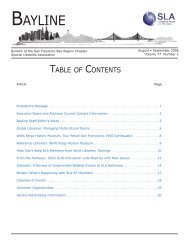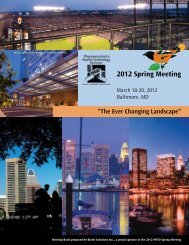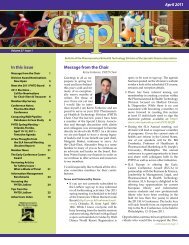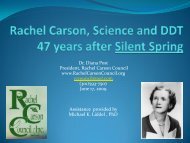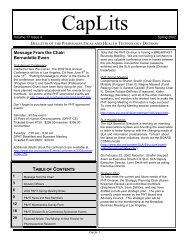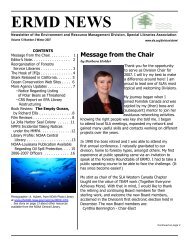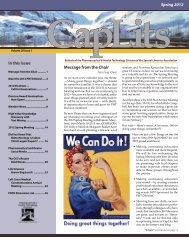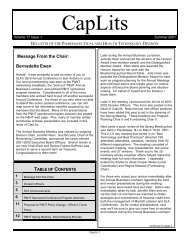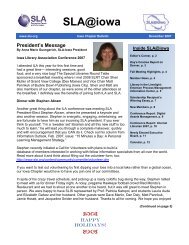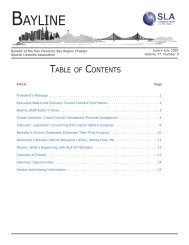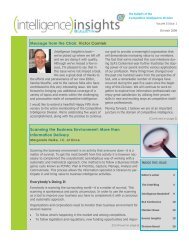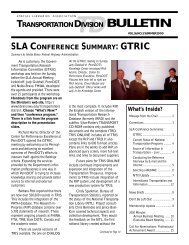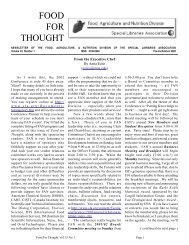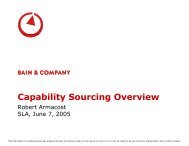Education Libraries - Special Libraries Association
Education Libraries - Special Libraries Association
Education Libraries - Special Libraries Association
Create successful ePaper yourself
Turn your PDF publications into a flip-book with our unique Google optimized e-Paper software.
Curriculum Center’s vision, mission, values, and<br />
guiding principles. Library faculty and<br />
administrators have reprioritized existing budgets,<br />
and they are developing strategies to obtain the<br />
resources that will have the greatest impact on<br />
EWU <strong>Libraries</strong>, including the center’s<br />
transformation.<br />
As part of the Information Services division of<br />
EWU <strong>Libraries</strong>, the Curriculum Center has not<br />
had a separate budget for operations. Under the<br />
library acquisition budget, the center has been<br />
allocated approximately $5,000 annually for<br />
collection development. In the past, this amount<br />
was supplemented by library funds for<br />
acquisitions by <strong>Education</strong> Department faculty.<br />
Most of these funds were used to maintain<br />
currency of the children’s fiction collection. The<br />
library relied on donations for the rest of the<br />
collection. As learning resources librarian, Meyer<br />
has prioritized use of these funds based on gaps in<br />
the collection, such as a lack of early reading<br />
materials to support EWU’s growing<br />
interdisciplinary program in early childhood<br />
development.<br />
Meyer has also targeted supplemental internal<br />
funding sources, such as the dean’s fund for<br />
collection development. She received a one-time<br />
allocation of $21,000 from this fund in Spring,<br />
2007 to update standard textbooks and<br />
supplemental materials with particular emphasis<br />
on mathematics and reading. Additional smaller<br />
amounts have been received from the general<br />
library budget for replacements and end-of-year<br />
requests. A mini-grant from the EWU Foundation<br />
was received in Fall, 2006 to purchase<br />
multicultural children’s literature loaded on iPod<br />
Shuffle mp3 players.<br />
Although the Curriculum Center’s collection<br />
development budget does not meet its goals, the<br />
changes in resource allocation and the addition of<br />
supplemental funding have been essential in<br />
demonstrating the library is committed to<br />
obtaining the resources that students and faculty<br />
need. Tangible changes in the Curriculum<br />
Center’s collections have encouraged three faculty<br />
groups (math, special education, and children’s<br />
literature) to open their closets and give the<br />
Curriculum Center materials that are current and<br />
useful.<br />
Meyer and other library faculty are developing<br />
strategies to provide quality teaching resources<br />
that use technology. For example, they are<br />
replacing some print resources with electronic<br />
resources where appropriate. The center had<br />
painstakingly acquired print curriculum guides<br />
from local, state, and national schools covering<br />
most subject areas. Because the guides were dated<br />
and inaccurate in the context of school reform,<br />
Meyer has withdrawn the print collection. Instead,<br />
the database Kraus Curriculum Development<br />
Library provides students with current, full-text<br />
curriculum guides. The library is currently seeking<br />
supplemental funding for instructional equipment<br />
through a proposal to the EWU Student<br />
Technology Fee Committee, which funds<br />
technology projects that deliver services directly<br />
to students.<br />
Organizational Leadership<br />
The final condition vital for transformation is<br />
organizational leadership. This condition underlies<br />
the other four conditions and enables them to be<br />
effective. The phrase “organizational leadership”<br />
refers not just to library administrators or<br />
managers, but also to staff at all levels of the<br />
organization. In The Power of Personal<br />
Persuasion: Advancing the Academic Library<br />
Agenda from the Front Lines, Julie Todaro<br />
discusses the decentralized nature of leadership in<br />
academic libraries (2006). To transform the<br />
Curriculum Center at EWU, organizational<br />
leadership has meant setting high expectations,<br />
removing barriers to communication, and<br />
encouraging flexibility across the organization.<br />
The 2006 position description for the learning<br />
resources librarian was explicit about the library’s<br />
high expectations for this position. This excerpt<br />
from the description details the expectations:<br />
Responsibilities: Transform a traditional<br />
materials collection into a K-20 teaching and<br />
learning resources center that emphasizes<br />
effective use of technology. The center will<br />
support the College of <strong>Education</strong> and Human<br />
Development’s K-12 teacher preparation<br />
<strong>Education</strong> <strong>Libraries</strong>, Volume 31, No. 2, Winter 2008 24



